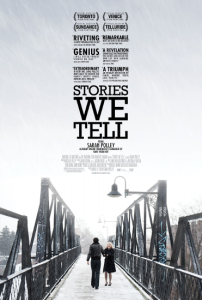 Sarah Polley uses a deeply personal story–the rumors surrounding her own lineage and conception–to explore how people choose to frame the narratives of their lives. Stories We Tell looks at different layers of connection to the parenthood rumors. It starts with Polley, the child at the center of the story. Then it jumps to her immediate family–father, brothers, and sister. Then it extends to her mother’s coworkers, friends, and acquaintances at the time of Sarah’s birth. The film quickly shifts focus spinning on individual discoveries, leading to a new round of questions for the people who shift in and out of the inner circle of the real history of Sarah’s birth.
Sarah Polley uses a deeply personal story–the rumors surrounding her own lineage and conception–to explore how people choose to frame the narratives of their lives. Stories We Tell looks at different layers of connection to the parenthood rumors. It starts with Polley, the child at the center of the story. Then it jumps to her immediate family–father, brothers, and sister. Then it extends to her mother’s coworkers, friends, and acquaintances at the time of Sarah’s birth. The film quickly shifts focus spinning on individual discoveries, leading to a new round of questions for the people who shift in and out of the inner circle of the real history of Sarah’s birth.
Stories We Tell is a documentary, albeit a very experimental one. For all of the traditional tools used (interviews, reenactments, voice overs, etc.), the structure is pure thriller. We’re dragged down the ever shifting sands of memory until Polley herself starts to lose track of the narrative. It evolves in such an organic (well, as organic as a thriller filled with misdirection and hidden secrets can be) way that the final moments are all the more revelatory. It doesn’t even matter that the mystery is solved by the halfway point; the initial search for truth was never the real point of the documentary.
It is unsettling to watch this story unfold. Everyone is so sure of their position, so positive that they know exactly what happened, that you begin to doubt everything you’ve been told. Polley constantly sets you up for surprises and failures. The biggest trick is declaring that this film’s real focus is on the identity of her father.

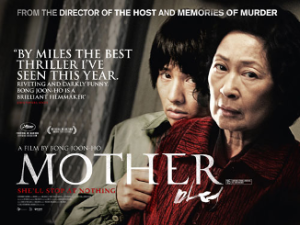 The new edition of Foreign Chops is up. This one is a tribute to one of my favorite film cultures, South Korea. Very few people participated, but the result was actually 16 posts covering 18 completely different South Korean films. I’ve never had a Foreign Chops without crossover before. That’s really cool. People who didn’t participate now have a very wide range of material to dig through and use as a tool to motivate them to see more Korean films.
The new edition of Foreign Chops is up. This one is a tribute to one of my favorite film cultures, South Korea. Very few people participated, but the result was actually 16 posts covering 18 completely different South Korean films. I’ve never had a Foreign Chops without crossover before. That’s really cool. People who didn’t participate now have a very wide range of material to dig through and use as a tool to motivate them to see more Korean films.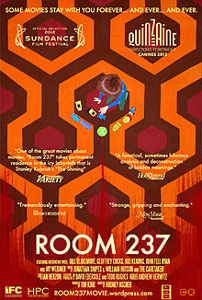 Forget everything you thought you knew about Room 237. Yes, technically it is a documentary that features fan theories about the true meaning of Stanley Kubrick’s The Shining. That’s the misdirection in the magic show. It’s really a real life horror film about film criticism, obsession, and twisting your perception of reality to come to terms with your pop culture idols not being everything you thought they were. I strongly encourage you to watch the film on Netflix when you get a chance. It’s really good. I actually think I should have given it a 5/5 at Man, I Love Films but I hesitated. If I hesitate before assigning a score, I grade down every time. So it’s a 4/5 there and possibly a 9/10 for our purposes at Sketchy Details.
Forget everything you thought you knew about Room 237. Yes, technically it is a documentary that features fan theories about the true meaning of Stanley Kubrick’s The Shining. That’s the misdirection in the magic show. It’s really a real life horror film about film criticism, obsession, and twisting your perception of reality to come to terms with your pop culture idols not being everything you thought they were. I strongly encourage you to watch the film on Netflix when you get a chance. It’s really good. I actually think I should have given it a 5/5 at Man, I Love Films but I hesitated. If I hesitate before assigning a score, I grade down every time. So it’s a 4/5 there and possibly a 9/10 for our purposes at Sketchy Details.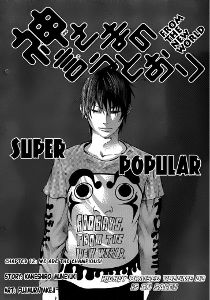 I’m terrified of Takashi Miike’s next film project. I’m a big fan of his style and know that if anyone can make this particular story work, it’s Miike, but it’s really disturbing.
I’m terrified of Takashi Miike’s next film project. I’m a big fan of his style and know that if anyone can make this particular story work, it’s Miike, but it’s really disturbing.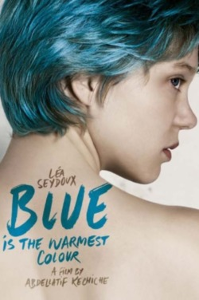 Blue is the Warmest Color is a quiet character study and romance unlocked by its title alone. Adele, a high school student focusing on literature, tries to fit in by dating the boy everyone knows she’s perfect for. She feels nothing from the relationship and winds up meeting Emma, a university fine arts student, at a lesbian bar. Emma’s bright blue hair catches her interest and helps her begin to form a sense of identity.
Blue is the Warmest Color is a quiet character study and romance unlocked by its title alone. Adele, a high school student focusing on literature, tries to fit in by dating the boy everyone knows she’s perfect for. She feels nothing from the relationship and winds up meeting Emma, a university fine arts student, at a lesbian bar. Emma’s bright blue hair catches her interest and helps her begin to form a sense of identity.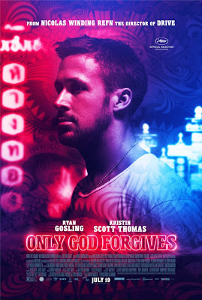 Nicholas Winding Refn has a mission. As a writer and director, he wants to take the subject matter of action films and raise it to high art. It’s a really interesting cinematic philosophy so far removed from anything else happening in mainstream or arthouse filmmaking that it’s going to be totally hit or miss in its impact. The flaws are perhaps the most endearing parts of films like Bronson and
Nicholas Winding Refn has a mission. As a writer and director, he wants to take the subject matter of action films and raise it to high art. It’s a really interesting cinematic philosophy so far removed from anything else happening in mainstream or arthouse filmmaking that it’s going to be totally hit or miss in its impact. The flaws are perhaps the most endearing parts of films like Bronson and  I love researching things. It’s not a joke. There is no punchline. I take great joy in finding something I don’t know and learning everything I can about it.
I love researching things. It’s not a joke. There is no punchline. I take great joy in finding something I don’t know and learning everything I can about it.